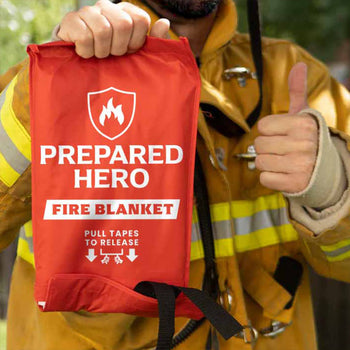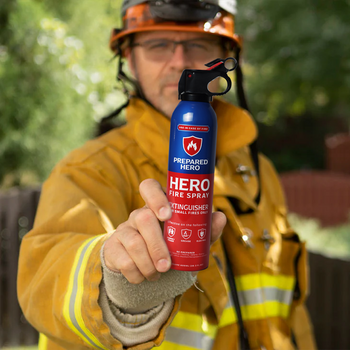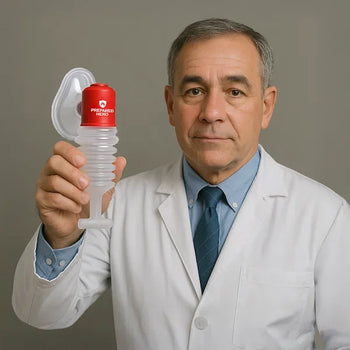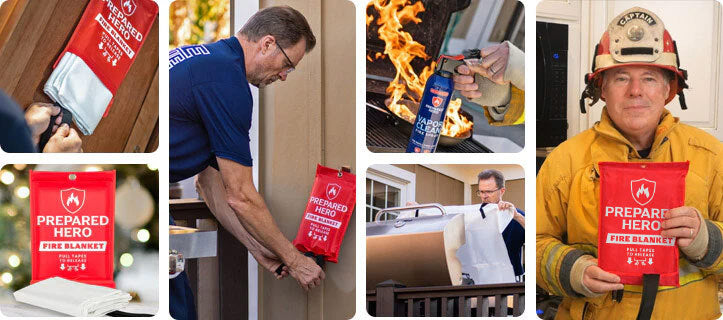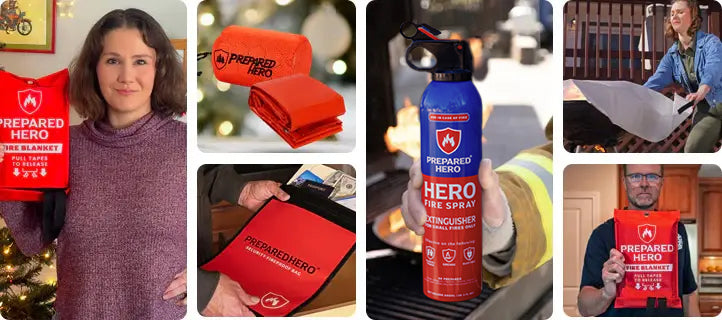Where you put your smoke detectors matters just as much as installing them. Proper placement makes sure they can detect...
Pepper spray is a powerful self-defense tool that can protect you from attackers. As much as we want this non-violent weapon to last forever, it doesn’t. Even though it’s not the first thing on our minds, we should understand how long pepper sprays last and how to tell they’re expired. In this guide, we’ll talk about how pepper sprays work, how long they last, and how to store them properly.
How Does Pepper Spray Work?

Pepper spray is a popular and effective self-defense tool designed to temporarily incapacitate someone. It gives you a chance to escape a dangerous situation. The main ingredient in pepper spray is capsaicin, which comes from hot peppers like cayenne. It causes immediate and intense discomfort when sprayed on someone’s face.
Pepper spray works by irritating the eyes, nose, and throat. The content causes a burning sensation, making the eyes water, swell, and often shut. This temporarily blinds the attacker, making it harder for them to pursue you. It also irritates the skin and causes a burning feeling. On top of that, pepper sprays can make breathing difficult and cause coughing. The effects are fast and intense when someone gets sprayed with it. The burning sensation starts almost immediately and can last up to an hour.
Pepper spray was originally created to protect people from wild animals like bears, mountain lions, and wolves. Though initially made for animals, it’s now used for personal self-defense. It’s a non-lethal way to stop an attacker without causing permanent harm. Of course, it’s important to remember that pepper spray is a tool for defense, not for aggression, and should only be used when necessary.
Pepper spray is made by mixing oleoresin capsicum (OC), a natural extract from hot chili peppers, a solution, and a propellant that helps it spray out. The solution is then pressurized in a can, which lets you spray it with some force. Most come in small cans you can easily carry in your bag or pocket. Depending on the design, they can shoot a stream, mist, or fog. The mist or fog options are often better for self-defense since they cover a wider area, making it easier to hit your target.
In addition, pepper spray can be quite strong. On the Scoville heat scale, which measures the heat of peppers, it can range from 500,000 to 5 million Scoville heat units (SHU). To put that into perspective, a jalapeño pepper only rates up to 8,000 SHU. This is why pepper spray feels so hot when it hits the skin or eyes.
While pepper spray seems easy to use, you should know how to do so without spraying it on yourself. Even though you don’t need special training, being familiar with it gives you more confidence in an emergency.
What’s In Pepper Spray?

Pepper spray contains capsaicin, the compound responsible for the heat in chili peppers. The capsaicin is extracted from peppers like cayenne and turned into a concentrated resin called oleoresin capsicum. Manufacturers grind peppers and use ethanol to draw out capsaicin. After the solvent evaporates, the waxy OC containing the active ingredient in pepper spray is left.
This OC resin is too thick to be sprayed on its own, so it has to be mixed into a liquid base. An emulsifier like propylene glycol is used to help mix everything and prevent them from separating. The solution is then pressurized inside the canister. The pressure lets the pepper spray be dispensed in an aerosol form when you press the button.
Some pepper sprays use alcohol to penetrate more easily into the skin. While this can make the spray more effective, it comes with risks. Alcohol is flammable, which can cause problems if pepper spray is used in situations involving sparks or fire, like when someone’s using a taser.
The strength of pepper spray is usually measured by its capsaicin and related capsaicinoids (CRC) content. These compounds cause a burning, stinging sensation when the spray hits the skin and eyes. The higher the CRC level is, the more intense the effect. Personal pepper sprays usually have 0.18% to 3% CRC, while law enforcement sprays range from 1.3% to 2%.
How Long Does Pepper Spray Last?

Pepper spray usually lasts for up to two years before it starts losing its effectiveness. The exact period depends on different factors, but two years is the average. Like other tools, pepper spray is subject to wear and tear. Over time, the spray becomes less effective, making it unreliable against criminals.
The main reason pepper spray expires is its active ingredient, oleoresin capsicum (OC), which becomes less potent over time. As the spray sits over time, the OC concentration weakens. As a result, it can’t produce the same strong, stinging effect when used.
The propellant in the canister also loses pressure over time. Without enough pressure, the spray won’t shoot far or with enough force. This makes it harder to hit your target. The spray may even just dribble out instead of spraying properly.
How you store your pepper spray also affects it. The content is affected if the can is exposed to extreme temperatures, like extreme heat or cold. High temperatures can cause the ingredients to degrade faster, and freezing can weaken the propellant’s pressure.
Most cans of pepper spray have an expiration date printed on them, and it's important to check that date. If it's expired, replace it as soon as possible. Even if the can looks fine, you can’t be sure it will work in real life.
How Do I Know if My Pepper Spray Is Expired?

You can tell if your pepper spray has expired by checking the expiration date printed on the can. If it’s past that date, replace your pepper spray as soon as possible. Experts recommend replacing your pepper spray after it expires, even if you haven’t used it.
If the expiration date isn’t visible or the can is old, check the pressure by pressing the button or trigger. If the spray comes out weakly or not at all, the propellant inside the canister has likely lost its pressure. The spray won’t be effective without enough pressure, no matter how much product is left.
Look for clogs or leaks around the nozzle or can as well. A clogged nozzle prevents the spray from being dispensed properly. Meanwhile, damage around the edges causes the content to leak and come into contact with your skin.
How Long Does Pepper Spray Last On the Skin?

Pepper spray lasts on the skin for 45 minutes to an hour, depending on the person and how much spray is used. The intense burning and irritation start right away and can feel pretty severe. The sensation can be different for everyone. But in general, you can expect a few minutes of sharp pain followed by a burning, stinging feeling that gradually fades.
The reason pepper spray lasts long on the skin is its active ingredient. When pepper spray lands on the skin, the OC particles stick to it. OC is an oil-based substance that can’t be quickly washed off like water. Because the spray doesn't easily dissolve, the burning sensation lasts longer.
In addition, OC’s effects on the skin are caused by how it interacts with nerve receptors. It triggers the pain receptors and causes an intense burning feeling. This can last as long as OC stays on the skin.
Another factor that affects how long pepper spray stays on the skin is the person’s skin type. People with oily skin might feel the burning sensation for longer because the oil can trap OC on the surface. On the other hand, dry skin might feel relief sooner. However, most people will feel discomfort for up to an hour, even if the burn starts fading after a few minutes.
Water alone can’t remove pepper spray on the skin. It can be removed with soap and water or a special decontamination solution to break down the active ingredient and wash it away.
How to Store Your Pepper Spray

Storing your pepper spray properly is important to make sure it stays effective when you need it. Here’s a step-by-step guide on how to keep it in good shape:
1. Store it in a cool, dry place.
Keep your pepper spray in a cool, dry environment when you’re not bringing it with you. Avoid leaving it in places with high humidity, like your car or bathroom. Moisture can also affect the active ingredients and cause the canister to lose pressure.
2. Avoid extreme temperatures.
Don’t store your pepper spray in areas where it can get too hot or too cold. Extreme heat can increase the pressure inside, which can lead to leaks or a burst. On the flip side, extreme cold can cause the propellant to freeze and make the spray less effective. Plus, don’t store your pepper spray in direct sunlight, like on a windowsill. UV rays can break down the ingredients inside and make them less reliable.
3. Keep it away from children.
Put your pepper spray out of reach of children or anyone who might accidentally use it. Children are naturally curious, so store your spray in a secure place, like a drawer with a lock or a cabinet that kids can’t reach.
4. Store it upright.
Always store your pepper spray upright to prevent leaks. Putting it in a vertical position helps keep the nozzle clear. It also makes sure the propellant is intact, which maintains the pressure.
5. Protect it from physical damage.
Store your pepper spray where it won’t get bumped or knocked around. You don’t want it to get damaged because the canister might malfunction or leak. Make sure to put it in an accessible spot where you can easily grab it when going out.
Is It Illegal to Carry Around Pepper Spray?

It is legal to carry pepper spray for self-defense purposes in the US. However, some states have restrictions. For instance, California, Wisconsin, and Illinois don’t allow pepper sprays to be sold to minors. Pepper sprays can’t exceed 300 ml in Arkansas, while retailers should be licensed to sell them in Hawaii.
Based on these state laws, age restrictions are common. You must be at least 18 years old to carry pepper spray in many states. Some states also require identification to prove your age when buying it.
Size and concentration also matter. Some states limit the size of the canister or the strength of the pepper spray. For example, certain places only allow smaller canisters for personal use. Some states also regulate the concentration of OC to prevent extremely strong sprays from being sold to the general public.
Laws vary by state, so it’s a good idea to research the laws in your area or consult a legal professional if you’re unsure. Following the rules ensures you can carry and use your pepper spray legally.
How Often Should You Replace Pepper Spray?

You should replace pepper spray as soon as it’s expired. You can find the expiration date on the can. The canister’s pressure decreases over time even if you haven’t used it. Similarly, the active ingredient degrades and loses its effectiveness.
The chemicals in the spray lose their potency due to temperature changes, age, and exposure to moisture and light. If the spray feels weak when you test it or doesn’t spray as far as it should, replace it right away. You should also replace it if you notice any damage to the canister, like dents or rust.
What Neutralizes Pepper Spray?

Baby shampoo, milk, antacids, and lidocaine can neutralize pepper spray. Here’s a detailed look at how each item neutralizes pepper spray:
Baby Shampoo
Baby shampoo is a popular choice because it’s gentle yet effective. The shampoo breaks down the oils in pepper spray. Pepper spray is made from OC, which is an oil-based compound.
In particular, baby shampoo contains mild surfactants that can help emulsify the oil. The shampoo makes it easier to wash the pepper spray off the skin, eyes, and other affected areas. Using baby shampoo also helps remove the OC without irritating the skin more.
Milk
Milk is another effective remedy for pepper spray. It contains fat molecules that can break down the capsaicin (the active ingredient in pepper spray). Capsaicin is oil-soluble, and the fat in milk helps dissolve and wash it away. Milk also has a soothing effect on the skin and mucous membranes, which helps calm the irritation and alleviate the pain.
Antacids
Antacids work by neutralizing the acidic components of the pepper spray. While pepper spray is made of oil, it also contains acidic compounds that contribute to the burning sensation. Antacids, which are alkaline, balance out the acidity and relieve discomfort. You can create an antacid solution by dissolving tablets in water and rinsing the affected area with it.
Lidocaine
Lidocaine is a topical anesthetic that can numb the pain caused by pepper spray. When applied to the skin, lidocaine blocks nerve signals. This helps relieve the burning sensation. You can find lidocaine in creams or sprays. While it’s effective at easing the pain, it’s not a long-term solution for completely removing the spray.
Prepared Hero Pepper Spray: Quality You Can Trust

Not all pepper sprays are made equal. Want to see how Prepared Hero’s Pepper Spray Keychain outshines the regular ones? Check out the table below:
|
Features |
Regular Pepper Spray |
Prepared Hero’s Pepper Spray Keychain |
|
Spray Quality |
Inconsistent; sprays all over the place, making it hard to hit your target. You and the attacker may both be affected. |
Sprays where you aim. You can easily hit your target while protecting yourself. |
|
Range |
Limited to just a couple of feet, allowing attackers to get too close before you can spray. |
Can work up to 12 feet. Keep a safe distance from attackers while defending yourself. |
|
Wind Sensitivity |
A little wind can blow the spray off target and into your face, leaving you helpless. |
Can be used effectively in windy or rainy conditions, ensuring accurate targeting. |
|
Shelf Life |
Short shelf life, typically one to two years. Might not work when you need it most. |
Reliable protection for five years, so you can trust it when it matters. |
|
Effectiveness |
Takes time to work. The spray needs to disperse in the air, allowing attackers time to act. |
Starts working instantly on contact, with a formula used by the military and police. |
|
UV Dye |
No UV dye, making it hard for authorities to identify the attacker after they flee. |
Has UV dye. Helps the police identify the attacker even after they escape. |
Check out the Prepared Hero's Pepper Spray Max if you need a long-range pepper spray. It can work up to 20 feet. It also comes with a safety cover that prevents accidental discharge and easily moves out of the way, so you can use the spray extremely fast. It’s the perfect companion when you go out at night, walk alone, drive strangers, jog, or walk your dog.
Conclusion
As much as we want pepper sprays to last forever, they don’t. The active ingredient weakens, and the pressure inside the canister drops over time. As a result, the pepper spray won’t be effective against criminals and won’t spray far when you need it. Knowing how long pepper spray lasts keeps you safe whenever you go out. If it’s past the expiration date or showing any signs of damage, replace it as soon as you can. Stay prepared, hero!


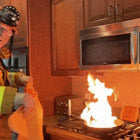 Fire
Fire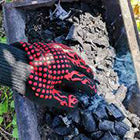 Safety
Safety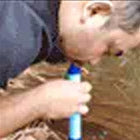 Survival
Survival Protection
Protection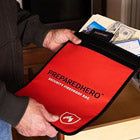 New
New
 Fire
Fire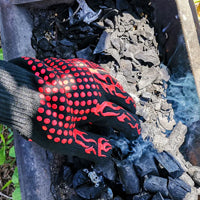 Safety
Safety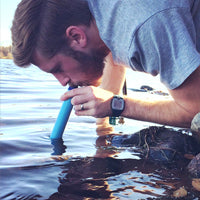 Survival
Survival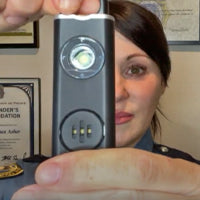 Protection
Protection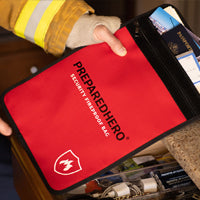 New
New
